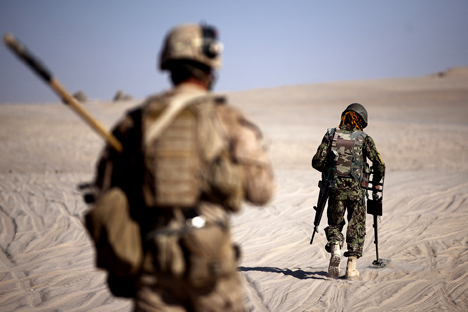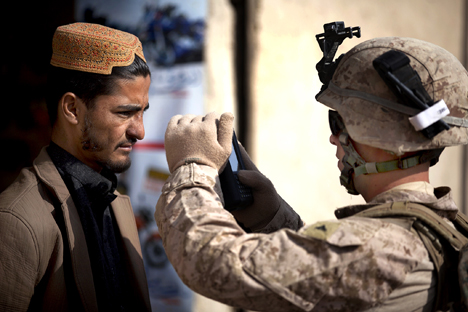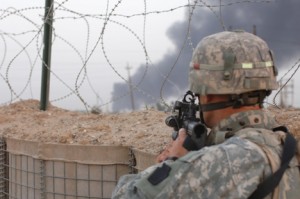Mickey Friedman
January 7. 2012
Few Americans know about David Emanuel Hickman. The media jabbers about Mitt Romney, Newt Gingrich, Ron Paul, Michele Bachmann and Rick Santorum and neglects David Emanuel Hickman.
For all their rhetoric about standing tall and tough and fighting the fight against Islamic extremism, the politicians do their talking surrounded by the trappings of wealth and power. They are the 1%. They are safe. David Emanuel Hickman went out to do their work and died. The Defense Department says he died in Baghdad on November 18, 2011 “of injuries suffered after encountering an improvised explosive device.”
The Army Times called Hickman “the last American fighter killed in combat” in Iraq. To our ever-lasting shame, Hickman will be remembered by his family and friends in North Carolina and by those who watched him playing outside linebacker for Northeast Guilford High School, but will never be known by the American people. There will be no parade past Wall Street for David Emanuel Hickman nor for Marine Pvt. Jonathan Lee Gifford, our first casualty.
The politicos and generals ended the war with the same kind of lies they began it. It’s been one lie after another. Vice-President Cheney told “Meet The Press” in December 2001 that “the evidence is pretty conclusive that the Iraqis have indeed harbored terrorists.” He said 9/11 hijacker Mohammed Atta met an Iraqi agent in Prague. Then on March 24, 2002 Cheney told CNN that Saddam Hussein “is actively pursuing nuclear weapons at this time.” Secretary of Defence Rumsfeld on ABC’s “This Week” on March 30, 2003, announced: “We know where [the weapons of mass destruction] are. They’re in the area around Tikrit and Baghdad and east, west, south and north somewhat.”
So a war began because of 9/11 and a nuclear threat to America, became what exactly? A delusional exercise touted as nation building but became nation killing. Occupy Iraq. Once a secular nation, albeit a dictatorship, Iraq was transformed into a battleground for religious purity. Sunnis killing Shiites and Shiites killing Sunnis and both of them ready to go after Christians and Kurds. Insane to think that men as intellectually-limited and dishonest as Bush, Cheney, and Rumseld could help anyone achieve democracy.
So rather than apologize to the Iraqis for our mistakes; rather than acknowledge our deep shame, we kept sending our men and women to fight a lie. And rather than acknowledge the truth of our folly, we continue today to lie.
And unless you take a moment to read “The Army Times” or seek out one of those we sent to do Bush and Cheney and Obama’s bidding, you won’t really know the true story of this war.
Secretary of Defense Leon Panetta is only the latest purveyor of the lie, telling our soldiers: “Your nation is deeply indebted to you. You have done everything your nation asked your to do, and more… you will leave with lasting pride, secure in knowing that your sacrifice has helped the Iraqi people begin a new chapter in history, free from tyranny and full of hope for prosperity and peace.”
We have left a nation in shambles: interfaith families who once lived in peace now split apart, women so much worse off, new legions of zealots. The one thing Iraqis can agree upon is getting rid of us.

U.S. Marine Lance Cpl. Zachary Fisher & Afghan National Army Sgt. Shah Baaz use metal detector in Helmand province, Afghanistan, Dec. 30, 2011 - U.S. Marine Corps photo by Cpl. Reece Lodder
Just as they lied about our purpose, they have lied about what it has cost. Cost the Iraqi people and cost us. The Pentagon tells us we suffered 4,487 dead, and 32,226 wounded. But that doesn’t include all those who came home to suffer some more. Post Traumatic Stress Disorder is a fancy way of saying that the war continues to live within them: the imagined IEDs that could be around the next bend in the road; the dreams of lost limbs; dreams of those killed and almost killed; soldiers who look like civilians and civilians who look like soldiers; signs written in a language you can’t decipher; people screaming words you can’t understand. Hundreds of thousands who served, maybe as many as half a million suffer from PTSD. For them, the war’s not over.

U.S. Marine Corps Lance Cpl. Steven Baumer scans Afghan man at Safar Bazaar, Helmand province, Afghanistan - U.S. Marine Corps photo by Cpl. Reece Lodder
The casualty figures don’t include those who were so seriously shaken by what they saw and what they did that they took their own lives. Joint Base Lewis-McChord in Washington saw more suicides in 2011 than any previous year. It just so happens that more than 18,000 soldiers from the base served in Iraq and Afghanistan in 2009-10.
But Gen. Martin Dempsey, chairman of the Joint Chiefs of Staff, speaking for all the generals who helped make this nightmare happen, hastens to assure us all “It has been a price worth paying.”
Someone asked me if I am going to continue to demonstrate against the war now that it’s over. But those who would have been going to Iraq will be sent to Afghanistan. The war’s not over.
_________________________________________________________________________________
Here are a few articles from The Army Times. They tell some of the stories most of us never read:
NC soldier is last combat casualty in Iraq.
Don Babwin and Tom Breen of The Associated Press write:
GREENSBORO, N.C. — As the last U.S. troops withdrew from Iraq on Sunday, friends and family of the first and last American fighters killed in combat cherished their memories rather than dwelling on whether the war and their sacrifice was worth it.
Nearly 4,500 American fighters died before the last U.S. troops crossed the border into Kuwait. David Hickman, 23, of Greensboro was the last of those war casualties, killed in November by the kind of improvised bomb that was a signature weapon of this war.
“David Emanuel Hickman. Doesn’t that name just bring out a smile to your face?” said Logan Trainum, one of Hickman’s closest friends, at the funeral where the soldier was laid to rest after a ceremony in a Greensboro church packed with friends and family.
From Vets to Moms Iraq War leaves mark on town.
Sharon Cohen of The Associated Press writes:
KOKOMO, Ind. — In a quiet park on the eastern edge of this auto manufacturing town, a gleaming ring of black granite walls and monuments stands in tribute to the war dead. Hundreds of names are etched in stone; many of them are long forgotten to history.
Not so the six newest additions: Brian M. Clemens. Robert L. McKinley. James E. Swain. Rickey E. Jones. Nathan J. Frigo. David N. Simmons.
Their smiles, their voices, their Little League games, their yearbook photos are fresh memories here to friends and family. Now the six — all of whom died in the Iraq war — are honored next to the walls on a granite monument inscribed with the words “Global War on Terror.”
Record year for suicides at Lewis-McChord.
The Associated Press writes:
JOINT BASE LEWIS-McCHORD, Wash. — Joint Base Lewis-McChord saw more suicides in 2011 than any previous year.
Twelve suicides were recorded at the base this past year. That’s up from nine in 2010 and nine in 2009, The Tacoma News Tribune reported.Army I Corps spokesman Lt. Col. Gary Dangerfield says the total could grow as the Army completes investigations ahead of its annual suicide report next month.
“We take suicide very seriously,” Dangerfield said. “We’re going to continue to push the envelope to make sure soldiers get the resiliency training they need.” The toll at Lewis-McChord rose despite new efforts to counsel soldiers when they come home from war, including the creation of a suicide-prevention office.
Ex-POW Lynch: ‘New perspective’ on Iraq wounds
Vicki Smith of The Associated Press writes:
MORGANTOWN, W.Va. — Jessica Lynch was just 19 when the world first saw her — a broken, blond soldier caught on combat video in Iraq, her face wearing something between a grimace and a grin.
The Army supply clerk was being carried on a stretcher after nine days as a prisoner of war. She had been captured along with five others after the 507th Maintenance Company took a wrong turn and came under attack in Nasiriyah on March 23, 2003. Eleven of her fellow soldiers died.
Lynch had joined the Army at 18 to earn money for college and become a school teacher. This Friday, at 28, she completes that mission.
She’ll spend Thursday finishing her training as a student teacher at the same elementary school she attended in sparsely populated Wirt County. Then, on badly damaged legs and a right foot that still pains her, she’ll walk across a stage Friday night and get her education degree from West Virginia University at Parkersburg.
“It’s tough to walk, but I look at it as, ‘At least I’m walking,’ ” she says. “At least I have my legs. They may not work. I have no feeling in the left one. But it’s attached, at least. … At least I’m alive.”
A previous version of “The War’s Not Over” appeared in The Berkshire Record on Thursday, January 5, 2012

